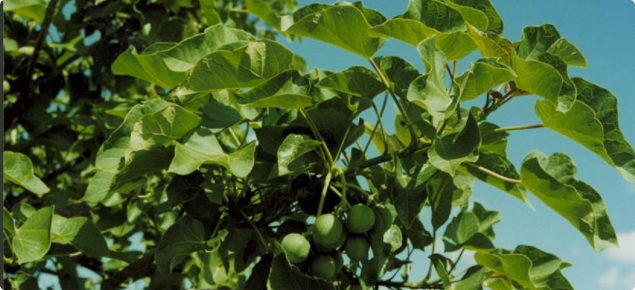Form: shrub/tree — perennial
Status: not known to be present in WA, if found please report
Physic nut is native to Mexico, the Caribbean, Central America and South America.
Appearance
An erect shrub or small tree with one to several stems two to four metres high reproducing by seed and suckers from roots and crown.
Stems: Thick and slightly soft, coarsely hairy, exuding a watery sap when damaged.
Leaves: Dark green, ivy-like, smooth, heart-shaped to 15 centimetres wide on a long leaf stalk. Margins three to four lobed.
Flowers: Yellow to green, small and inconspicuous.
Fruit: Dark brown when ripe, a fleshy globular capsule four centimetres long containing two to three seeds.
Seed: Black with fine yellow stripes, bean-like, 1.7 centimetres long, smooth on one side but with a ridge along the other side.
Agricultural and economic impact
Physic nut is a drought-resistant perennial plant which can grow under a wide range of climatic and soil conditions; it grows well in marginal/poor soil. It is regarded as an environmental weed or potential environmental weed in many parts of northern Australia. Plants are usually found in disturbed areas, especially around abandoned homesteads and mines.
This weed competes with native species or pasture plants can eventually form dense thickets or colonies. If it is allowed to establish widespread populations over time, it may threaten some of Australia's rangeland communities. In Queensland, physic nut is regarded as a weed because of its potential to invade savanna lands and compete with pasture.
All plant parts, including sap, are highly toxic to humans and livestock.
Declared pest category
The Western Australian Organism List (WAOL) contains information on the area(s) in which this pest is declared and the control and keeping categories to which it has been assigned in Western Australia (WA). Search for physic nut in the WAOL using the scientific name Jatropha curcas.
Requirements for land owners/occupiers and other persons
Requirements for land owners/occupiers and other persons if this pest is found can be sourced through the declared plant requirements link.
Search > detect > report
| MyPestGuide™ Reporter | Pest and Disease Information Service (PaDIS) |
Control method
Report the presence of this organism before undertaking a control measure. Control methods for this declared plant can be found through the physic nut control link.
Further details
Further details on this declared plant can be found in the link physic nut and bellyache bush: what you should know.



